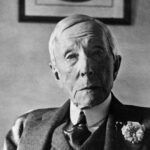
Immanuel Kant, a towering figure in philosophy, left behind a legacy of profound wisdom and intellectual inquiry. His quotes resonate through the ages, offering timeless insights into human nature, morality, and the pursuit of knowledge. In this blog post, we delve into 25 quotes by Immanuel Kant that will inspire, provoke thought, and challenge your perspective.
The Starry Sky of Morality:
“Two things awe me most, the starry sky above me and the moral law within me.” – Immanuel Kant
In this quote, Kant beautifully juxtaposes the grandeur of the cosmos with the innate sense of morality that resides within each individual. He invites us to contemplate the awe-inspiring beauty of the universe while acknowledging the moral compass that guides our actions.
The Essence of Morality:
“In law a man is guilty when he violates the rights of others. In ethics he is guilty if he only thinks of doing so.” – Immanuel Kant
Kant draws a clear distinction between legality and morality, emphasizing that ethical wrongdoing extends beyond mere actions to include intentions. This quote challenges us to introspect and consider the ethical implications of our thoughts and motives.
The Dignity of Truth:
“By a lie, a man… annihilates his dignity as a man.” – Immanuel Kant
Here, Kant highlights the profound consequence of deception on human dignity. He underscores the importance of truthfulness as fundamental to maintaining one’s integrity and moral worth.
The Pursuit of Happiness:
“Happiness is not an ideal of reason, but of imagination.” – Immanuel Kant
Kant reminds us that while happiness is a cherished aspiration, it is not solely attained through rational means. Rather, it is shaped by the imagination and subjective experiences that define our individual pursuits of fulfillment.
The Enigma of Metaphysics:
“Metaphysics is a dark ocean without shores or lighthouse, strewn with many a philosophic wreck.” – Immanuel Kant
In this evocative metaphor, Kant characterizes metaphysics as a vast and mysterious realm of philosophical inquiry. He acknowledges the challenges inherent in grappling with abstract concepts beyond the realm of empirical observation.
The Divine Imperative:
“Religion is the recognition of all our duties as divine commands.” – Immanuel Kant
Kant offers a perspective on religion that transcends dogma, presenting it as a framework for recognizing and fulfilling our moral obligations. He emphasizes the sacred nature of ethical duties as intrinsic to human spirituality.
The Universal Principle of Action:
“So act that your principle of action might safely be made a law for the whole world.” – Immanuel Kant
This quote encapsulates Kant’s renowned categorical imperative, urging individuals to act according to principles that are universally applicable. It calls for ethical conduct that transcends personal interests and aligns with the moral welfare of humanity.
The Triad of Inquiry:
“All the interests of my reason, speculative as well as practical, combine in the three following questions: What can I know? What ought I to do? What may I hope?” – Immanuel Kant
Kant outlines the fundamental inquiries that drive human curiosity and moral deliberation. These questions serve as pillars of philosophical inquiry, guiding us in the pursuit of knowledge, ethical conduct, and existential meaning.
The Imperfection of Humanity:
“Out of timber so crooked as that from which man is made nothing entirely straight can be carved.” – Immanuel Kant
In this poignant reflection, Kant acknowledges the inherent flaws and complexities of human nature. He recognizes the limitations of human striving amidst the inherent imperfections of existence.
The Marriage of Theory and Experience:
“Experience without theory is blind, but theory without experience is mere intellectual play.” – Immanuel Kant
Kant emphasizes the symbiotic relationship between empirical experience and theoretical understanding. He highlights the importance of integrating observation with conceptual frameworks to attain meaningful insights.
The Compassion Imperative:
“He who is cruel to animals becomes hard also in his dealings with men. We can judge the heart of a man by his treatment of animals.” – Immanuel Kant
Kant underscores the interconnectedness of compassion and moral character, suggesting that cruelty towards animals reflects a deeper moral deficiency. This quote urges empathy and kindness towards all living beings as a measure of one’s humanity.
Immanuel Kant’s quotes continue to resonate with profound relevance in our contemporary world, offering timeless wisdom that transcends the boundaries of time and culture. As we reflect on his insights, may we strive to cultivate ethical awareness, intellectual inquiry, and compassion in our pursuit of a more enlightened existence.








